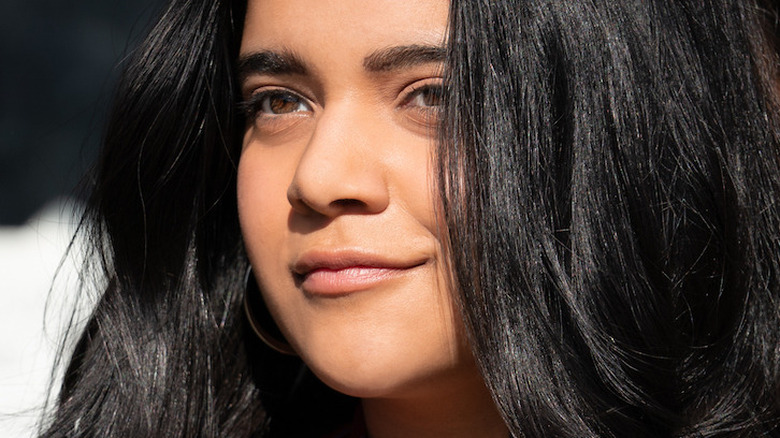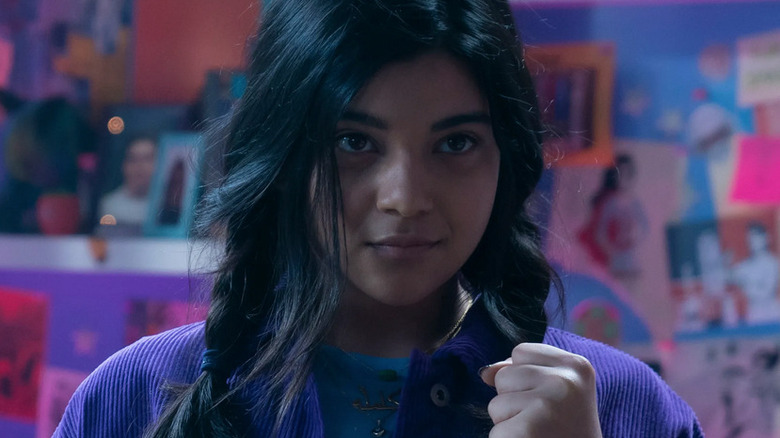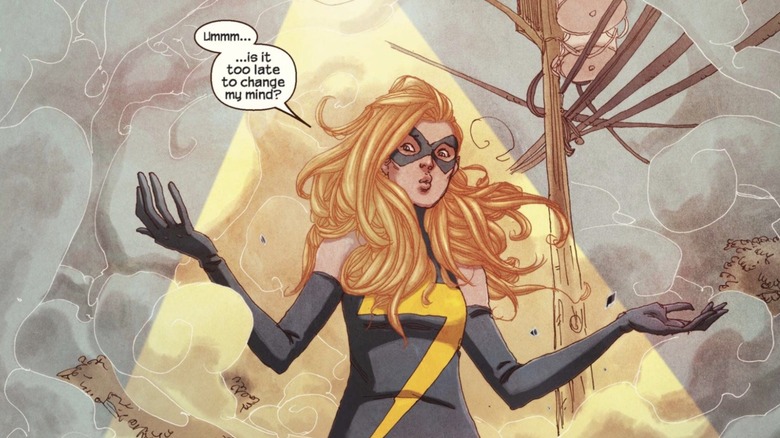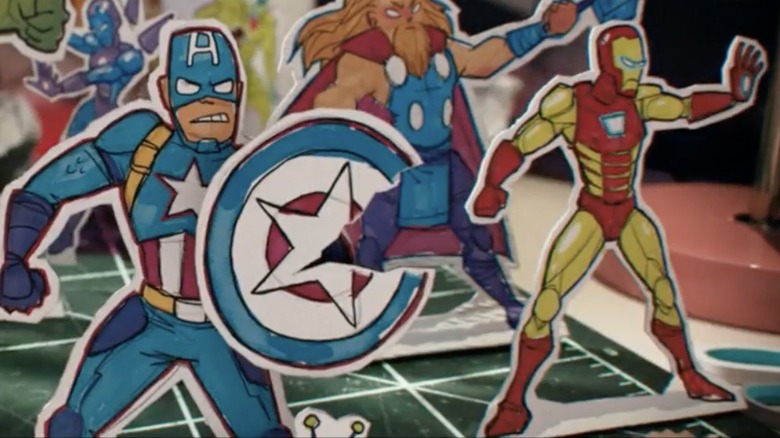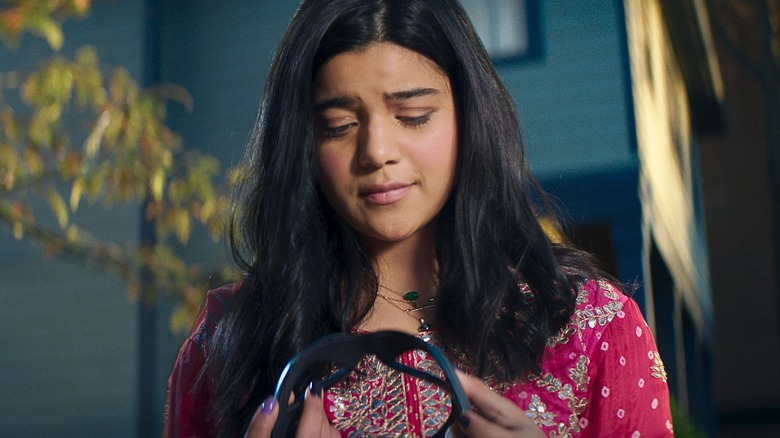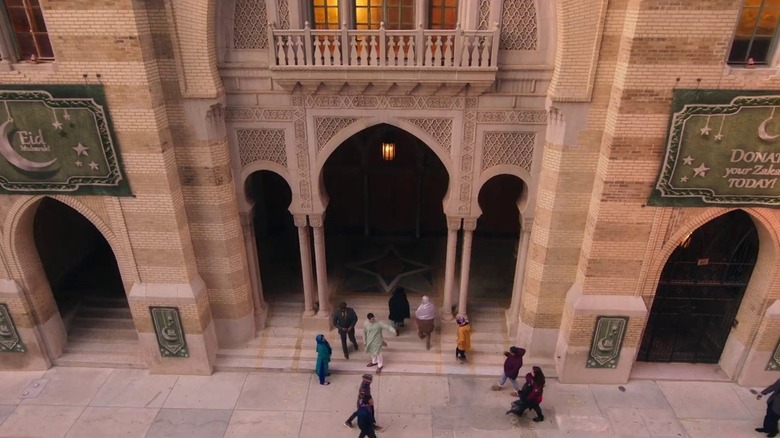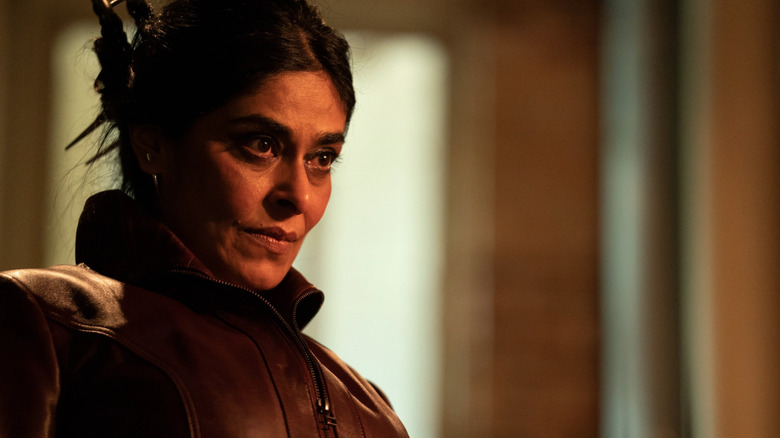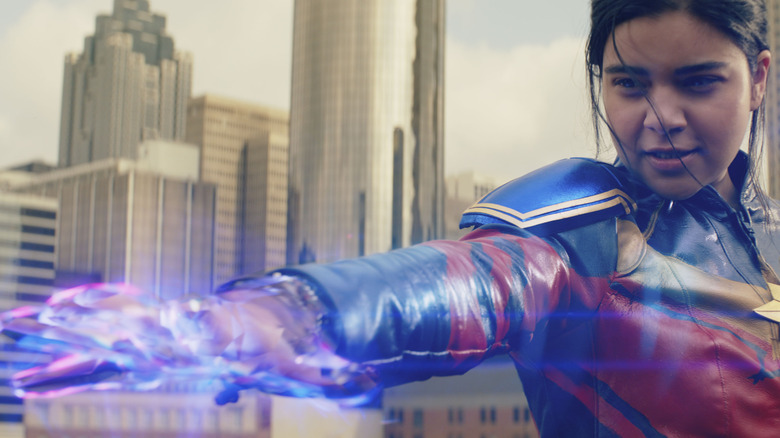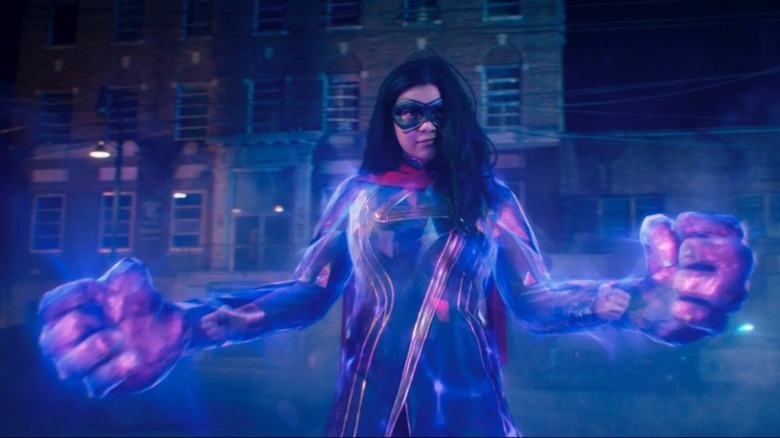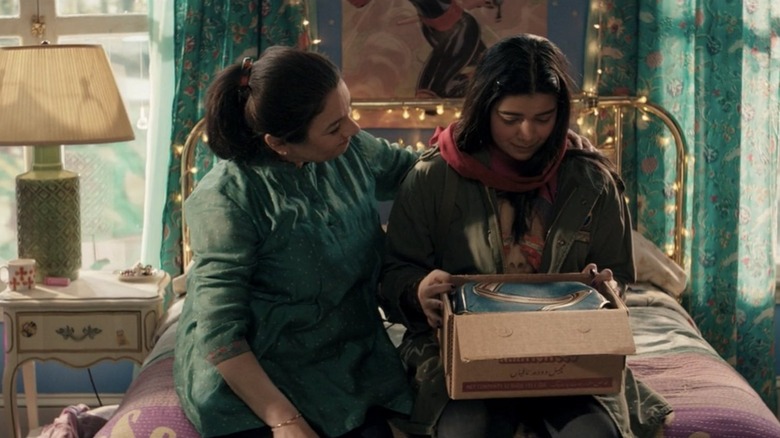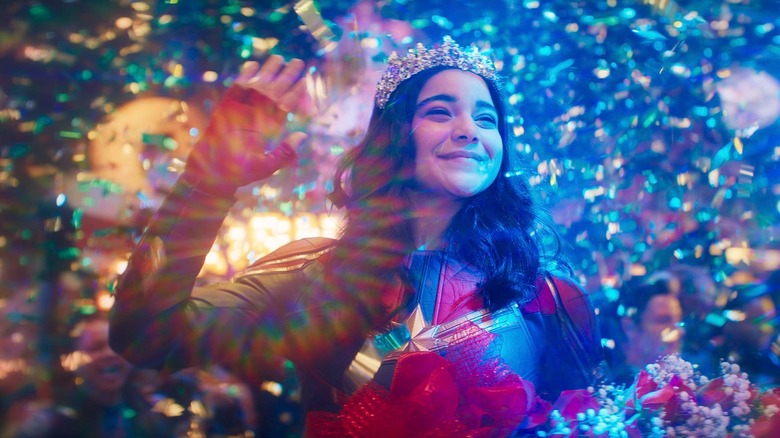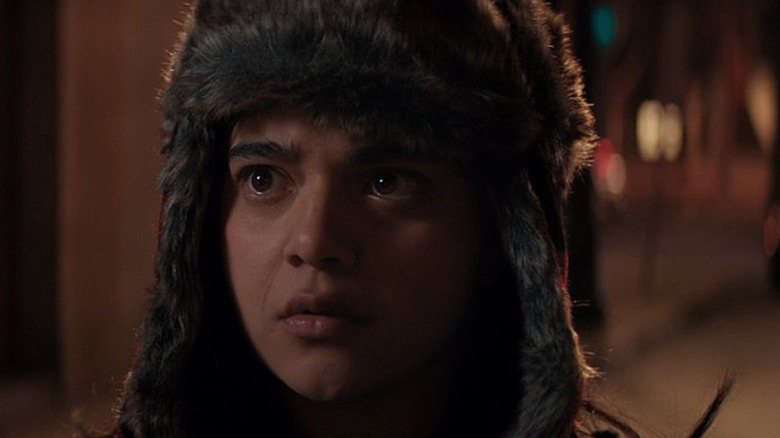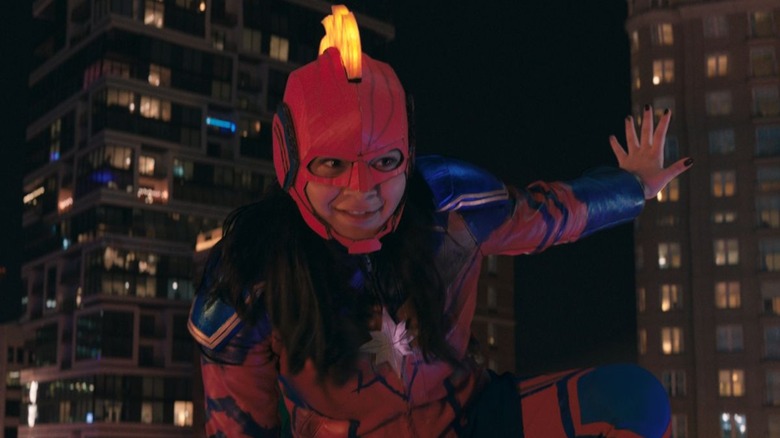The 6 Best And 6 Worst Things About Ms. Marvel
At a time when the critical response to Marvel movies is growing surprisingly lackluster, along comes "Ms. Marvel" to snap us out of our superhero fatigue and prove that the MCU is still capable of producing top-notch entertainment. This spectacular Disney+ series spotlights Kamala Khan, a Pakistani American high school girl and Captain Marvel super-fan who suddenly finds herself wielding cosmic powers. It might very well be the best MCU streaming series so far.
That does not, however, mean that "Ms. Marvel" is a perfect slice of storytelling. While "Ms. Marvel" overcomes many of the biggest flaws associated with the MCU's TV series, it's still constrained by its format and can't quite capture all the strengths of its comic book source material. But acknowledging these relative weak points doesn't dim its genuinely incredible high points, nor its consistently high quality. From Kamala's powers to the series' length, these are the six best and six worst things about "Ms. Marvel."
WARNING: The following contains spoilers for every episode of "Ms. Marvel" Season 1!
BEST: Iman Vellani is a star
Casting has always been one of Marvel Studios' greatest strengths, and the discovery of previously unknown Pakistani Canadian actress Iman Vellani may very well be the single best thing about "Ms. Marvel." Simply put, Vellani is perfect for the role of Kamala Khan. She's so perfect, in fact, that it genuinely feels like she is Kamala Khan, the same way it feels like Robert Downey Jr. is Tony Stark and Chris Evans is Steve Rogers.
Everything about Kamala, from her vibrant imagination to her struggles with family and cultural identity to her hardcore Avengers fangirling, feels totally real and fully believable. Some of these facets (the superhero geekdom in particular) match Vellani's own personality: As "Ms. Marvel" directors and executive producers Adil El Arbi and Bilall Fallah revealed to Beyond the Trailer, Vellani is a serious Marvel fangirl. But that doesn't mean she's playing herself. Rather, her familiarity with what it means to be an Avengers devotee feeds her immense talent and charismatic screen presence. We hope to see much more of her — not just in the MCU, but in other movies and TV productions as well — in the future.
WORST: It softens the comics' harder edges
Kamala's powers in the MCU are very different from her powers in the comics. This creates a big missed opportunity: The "Ms. Marvel" streaming series can't include the part of her origin story where she shapeshifts into Carol Danvers. This moment, which happens in 2014's "Ms. Marvel" #1, is a striking way to explore internalized racism and body image issues. It might have been considered too risky to bring to the Disney+ adaptation, or considered an acceptable price to pay for the benefits of changing her powers. But it's one of many ways "Ms. Marvel" softens some of the sharper and more complicated edges of its source material.
This isn't the only thorny issue "Ms. Marvel" leaves behind. Aamir and Tyesha's marriage is used to talk about racism and colorism within the Pakistani community in the comics, but the show doesn't have the time for that discussion. While the "Ms. Marvel" streaming series still deals with more serious and complex political themes than most of the MCU, we highly recommend reading the comics for a richer and more nuanced exploration of these issues.
BEST: vivid visuals
Adil El Arbi and Bilall Fallah, the filmmaking duo behind "Bad Boys for Life" and HBO Max's "Batgirl," directed the first and last episodes of "Ms. Marvel." These installments firmly establish the show as one of the most utterly stylish things to ever come out of the MCU. The bold energy of this pair's filmmaking is a nonstop joy to watch, and really allows the viewer to enter Kamala's perspective.
Crucially, these episodes' use of animation — inspired by the expressive and inventive style of "Spider-Man: Into the Spider-Verse," as the directing duo discussed on Beyond the Trailer – is instantly charming and gives the show a personality unlike any other MCU production. Kamala's world is a colorful wonderland full of vibrant corner stores, crowded bedrooms, and glittering convention halls. Great cinematography and ambitious effects also make an impact: "Ms. Marvel" often fits Kamala's text messages into the environment around her, which feels like something straight out of an Edgar Wright movie. In starting and ending "Ms. Marvel" with a major visual bang, El Arbi and Fallah give Kamala the distinctive aesthetic she deserves.
WORST: less stylish middle episodes
"Ms. Marvel" Episode 2, "Crushed," directed by Meera Menon, successfully keeps Episode 1's momentum going. After that, however, is a three-episode stretch that changes the style of the show. Episode 3, "Destined," has a great wedding sequence and a subsequent Bon Jovi-laden fight scene, admittedly. But the animated elements that are so significant in the first two episodes are almost entirely absent from "Destined," and the filmmaking defaults to the MCU house style.
Episodes 4 and 5 — "Seeing Red" and "Time and Again," respectively — are set in Pakistan. Here, "Ms. Marvel" hands the directing reins over to documentary filmmaker Sharmeen Obaid-Chinoy. The more naturalistic style of these episodes works for the material, but at this point, viewers might find themselves missing the pop energy of the first two episodes. That energy returns in the finale, "No Normal," but the show's inconsistency is a disappointment — especially since it starts off so strong.
BEST: cultural representation
"Ms. Marvel" is proof that seriously engaging with issues of identity and portraying cultures with real specificity enriches a story for all audiences. Characters' varying levels of religious observance, struggles with assimilation, joyous holiday celebrations, jokes about mosque cliques, and experiences with government discrimination are all well-integrated into the story. The series gets even deeper when it explores the legacy of the partition of India on Kamala's family, discusses the work of Bollywood icon Shah Rukh Khan, and sees Kamala's father watch cricket, one of Pakistan's most popular sports. Muslim and South Asian writers have discussed how powerful it is to see a superhero who represents them with this sort of vibrancy for outlets like the BBC and NPR.
Even if you're not part of the community represented, this is all extremely interesting to take in. The specificity of "Ms. Marvel" makes the story feel much more real and gives Kamala greater depth and nuance. Moreover, the cultural issues the series deals with are widely relatable, even to people with vastly different backgrounds. Plenty of folks deal with strict parents, cultural marginalization, and assimilation angst, even if they're not from a Pakistani American family. This is all further proof that in-depth cultural representation and universal appeal are not exclusive concepts.
WORST: The Clandestines are underdeveloped
So far, Marvel's Disney+ shows tend to take one of two routes regarding villains: They either reveal the bad guy in late-in-the-game twists that are ultimately superfluous to the hero's internal conflict ("WandaVision," "Loki") or they fill up the story with a ton of different villains ("The Falcon and Winter Soldier," "Hawkeye"). "Ms. Marvel" does a bit of both. Much of this series is low-key and personal, to the point that the villains are a lot less interesting than Kamala, which fits the first pattern. But there are also a whole bunch of them, which fits the second. By and large, they boil down to two groups: the Department of Damage Control and the Clandestines.
The Department of Damage Control's role in the story is handled satisfyingly enough: They're a realistic group of villains representing the threat of racial profiling through government surveillance. The Clandestines, in contrast, feel like they need a bit more development to be truly compelling. The concept of a group of Djinn trapped in the human realm who are trying to return home at any cost has potential. Moreover, the fact that Kamala's great-grandmother Aisha was part of their group until she left, spurring them to kill her, gives their antagonism personal stakes. However, the characters themselves are underbaked, and the way they're bumped off by the inter-dimensional gateway they were seeking feels anticlimactic.
BEST: Kamala's new powers
Some comic fans might have been concerned leading up to the release of "Ms. Marvel," as the series changes the title character's powers. Rather than developing shapeshifting abilities after exposure to the Terrigen Mist, Kamala Khan now gains access to light-based powers from the Noor Dimension after putting on a special bangle. These new abilities are a pretty huge shift from the source material, but they actually work for the sake of the story the show tells.
First off, watching Kamala get used to her new powers makes for compelling drama. Seeing her struggle to maintain platforms of light when she saves a boy from a life-threatening fall in "Crushed" is heart-pounding stuff. The fact that her abilities are related to her being part-djinn is also a clever way to connect her strength to her culture. It's the sort of detail that would feel right at home in one of "Ms. Marvel" writer G. Willow Wilson's other fantasy novels.
Beyond this, the fact that so much about Kamala's powers remains unexplained allows the series to throw some powerful curveballs, as in the time travel excursion at the end of "Seeing Red" and the start of "Time and Again." It also allows for the introduction of the character's classic powers in the finale.
WORST: Kamala's old powers
The action sequence in "No Normal," the Season 1 finale, sees Kamala finally "embiggen" as she does in the comics. Allowing her to shapeshift using the Noor glow is a theoretically solid way to merge her already-established live-action powers with the comics' imagery. However, this moment could have been improved significantly if it had been given a stronger set-up.
New powers suddenly making themselves known is a thing that happens frequently enough in "Ms. Marvel" that her classic comic abilities popping up out of nowhere isn't a problem unto itself. What makes this feel slightly off is that, unlike every other time Kamala discovers a new ability and is understandably taken aback, she embiggens for the first time with complete confidence. While this may make sense as an extension of the powers she's already gotten used to, the special effects are just vague enough in motion that in some shots, it looks like she's actually shapeshifting, as opposed to just using more elaborate Noor constructs. This is significantly confusing. The post-credits scene in which Kamala and Carol Danvers switch places only adds to the confusion over her powers: Some Twitter users are even convinced Kamala shapeshifts into Carol in this moment, like she does in the comics.
BEST: the moving family story
Like every MCU superhero, Kamala gets a fancy costume. Some fans might have been initially critical of this, however, as in the comics, Kamala makes her first costume herself. There's something inimitably special about the fact that she puts her duds together with her own two hands. But then the final episode of the series dropped, which reveals this costume is a gift from her mother. It's the perfect centerpiece for the ultimate collaboration between Kamala's background and her superhero identity. How could any viewer not be at least a little bit moved?
Between "Turning Red," "Everything Everywhere All at Once," and now "Ms. Marvel," 2022 has proved to be a banner year for work that explores family issues in the Asian diaspora. Kamala's family is at the heart of the show's biggest laughs (the Hulk cosplay!), heaviest tragedies (Aisha's experiences of Partition), and its most inspiring moments (Kamala's conversation with her dad about her name). Even if Kamala didn't have superpowers, her family would still be interesting enough to deserve an entire TV show.
WORST: stretching believability
When a show's as good as "Ms. Marvel," viewers don't have a ton of major things to complain about — but that's not going to stop them from noticing minor discrepancies. While the MCU is not the real world, the fact that "Ms. Marvel" is among its more grounded series makes problems regarding believability stand out. A big issue crops up in Episode 1, "Generation Why," regarding Kamala's plan to sneak out in the evening to attend New Jersey AvengerCon. Anyone who's been to a convention could tell you that these events are typically not evening-centric things. In fact, most conventions close their dealers' rooms right around dinner time.
Kamala puts another fanciful plan together in the series finale, this time for fighting Damage Control. It's entertaining to watch, but it also strains believability. Could a few teenagers really fend off the heavily-armed bad guys just by running around and setting up some pitching machines? Granted, superhero stories have asked fans to accept wilder odds than that, and a key part of the genre is the fantasy of ordinary people being able to make a real difference. But this might just be a bridge too far for many viewers of "Ms. Marvel."
BEST: Marvel's mutants make their debut
It turns out that Kamala Khan is the first mutant to be introduced in the mainline Marvel Cinematic Universe (we're not counting the alternate worlds presented in "Doctor Strange in the Multiverse of Madness"). As far as season finale teases go, this is a big one. There are lore questions that will have to be answered eventually — with all the implications of a Kree-Clandestine connection, might there be a Kree-mutants connection? — but right now, there's one especially useful thing "Ms. Marvel" does to set up the future: It introduces the themes of the X-Men in a way that makes sense within the MCU.
This key component appears at the start of "No Normal" when two Department of Damage Control agents are discussing what happens when, as they put it, "the wrong people" gain superpowers. The initial implication is that they're profiling Muslims, and that's likely to be partially true. But then one of the agents clarifies that "the wrong people" means children.
The biggest challenge of integrating mutants into the MCU is figuring out what it means to include a group that's oppressed for their powers in a world filled with super-beings who are decidedly not oppressed for having similar powers. Damage Control's attitude in "Ms. Marvel" might make the most sense as a thematic thrust for the MCU's X-Men: These mutants might not be oppressed because of their powers, but because they're seen as "the wrong people" to hold them.
WORST: not enough episodes
With the exceptions of the deeply episodic "WandaVision" and "What If...?,"Marvel's Disney+ series tend to feel more like very long movies, rather than traditional TV shows. "Ms. Marvel," in contrast, has a stronger episode-to-episode structure than most MCU series. But more than any of them, it also feels like it needs more episodes to truly become the best version of itself.
So much of the initial appeal of the first few episodes lies in the more grounded elements of Kamala's world. But high school drama and Jersey City's tightly-knit community are temporarily abandoned halfway through the season by the demands of the plot and Kamala's trip to Pakistan. Every aspect of the show is interesting — so interesting, in fact, that it's difficult to imagine Kamala's origin being packed into a single movie. But certain elements should have even more room to breathe.
With more episodes, "Ms. Marvel" could have been the next "Buffy the Vampire Slayer" in terms of balancing relatable teen struggles, pulse-pounding action, and overarching storytelling. Obviously, the budget needed for, say, a 22-episode season that maintains the production quality "Ms. Marvel" enjoys would be unfeasibly big. But even just expanding Season 1 to eight or 10 episodes, or letting the show do two seasons before Kamala's whisked away to the cosmic space of "The Marvels," could have let the story shine more brightly.
